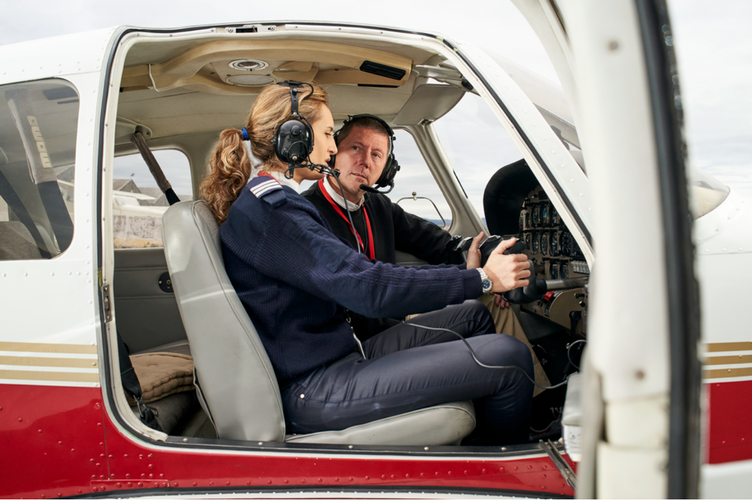Posted by Richard G. on Apr 4th 2024
If you're a pilot looking to soar to the next level and share your expertise with prospective aviators, becoming a certified flight instructor (CFI) could be your next great adventure. A flight instructor certification is not just a title—it's an invaluable credential allowing experienced pilots to train others for private or commercial ratings.
But what does it take to earn this certification, and what are the benefits? This comprehensive guide will take you under the wings of the CFI process, providing a detailed flight plan for your certification.
What is a Flight Instructor Certification?
A flight instructor certification is essentially a green light for qualified pilots to teach student pilots.
This certification is pivotal in shaping the new generation of pilots, as CFIs are responsible for ensuring their students meet the essential standards required for their private or commercial rating.
Eligibility Requirements For A Flight Instructor Certification
Before reaching for the sky, one must ensure they meet the minimum requirements:
- Age: Aspiring CFIs must be at least 18 years old.
- Language Proficiency: It's imperative to be proficient in English, the international language of aviation.
- Pilot Licenses: A valid commercial pilot license or airline transport pilot license along with an instrument rating
- Flight Experience: Log a minimum of 250 total flight hours.
Let’s look at each of these criteria:
To become a CFI, you must be at least 18 years old. This is similar to age requirements for other types of pilots licenses (and many other licenses, for that matter).
The second requirement is proficiency in English. No matter where in the world you may be flying, clear and effective communication is absolutely essential to avoiding potential disaster. That’s why the International Civil Aviation Organization (ICAO) requires that all pilots pass an English language proficiency test as part of their pilot training.
As a prerequisite to acquiring Flight Instructor Certification, you must hold either a valid commercial pilot license or an airline transport pilot license. And as an additional requirement, you must also hold a valid instrument rating.
And finally, aspiring CFIs must have logged a total of 250 flight hours.
How To Apply For And Acquire A Flight Instructor Certificate
Apply via the Integrated Airman Certification and Rating Application (IACRA) website. It's a streamlined portal for processing various airman applications, including CFIs.
To obtain the certification, there are two exams that must be completed:
- Written Exam: Test your knowledge on a range of topics from flight theory to FAA regulations.
- Practical Exam: Known as the FAA Practical Exam or "checkride," which includes an oral and in-flight assessment scrutinizing your teaching acumen and piloting competence.
Here are some of the resources you’ll need to prepare for your exams:
- ASA: The Flight Instructor’s Manual - Valuable resource for flight instructor applicants and a crucial guide for new and experienced instructors
- ASA: Aviation Instructor's Handbook - Comprehensive resource to prepare for the Fundamentals of Instructing Knowledge Exam.
- ASA Practical Test Standard: CFI Instrument - Guide for students, instructors, and FAA-designated examiners to know what is expected of pilots during a checkride.
- ASA Test Prep: CFI - Study questions for Fundamentals of Instructing (FOI), Flight, Ground, Military and Sport Instructor FAA Knowledge exams, supported with answers and explanations.
- ASA Oral Exam Guide: Certified Flight Instructor - Contains the questions most frequently asked by FAA examiners during the CFI checkride, and the appropriate responses.
Flight Instructor Certificate Details
Every 24 months, a flight instructor must complete an FAA-approved Flight Instructor Refresher Course (FIRC). It keeps CFIs updated with the latest aviation practices, safety procedures, and regulatory changes.
Carrying Passengers: Certified CFIs may carry passengers, making it possible to share in-flight experiences with others.
Flying in All Weather Conditions: If you possess an instrument rating, your CFI allows you to teach irrespective of weather conditions, bolstering your capacity to provide comprehensive flying instruction.
Flying Higher: Beyond Basic Certification
While the foundational CFI allows you to instruct students towards their private and commercial certificates, there are additional certifications that can expand your horizons:
- CFII (Certified Flight Instructor – Instrument): Specialize in teaching instrument flying.
- MEI (Multi-Engine Instructor): Certify others to fly multi-engine aircraft.
Earning a flight instructor certification is a testament to a pilot's skill, knowledge, and dedication to the art of flying. As a CFI, you play a critical role in molding the future of aviation, imparting wisdom and facilitating the growth of this vital industry.
Whether you've set your sights on this path as a career move or to share your passion for flying, remember that the sky is not the limit—it's the beginning. Ready to take off? Make sure to check out the IACRA website and begin charting your course to becoming a flight instructor today.

